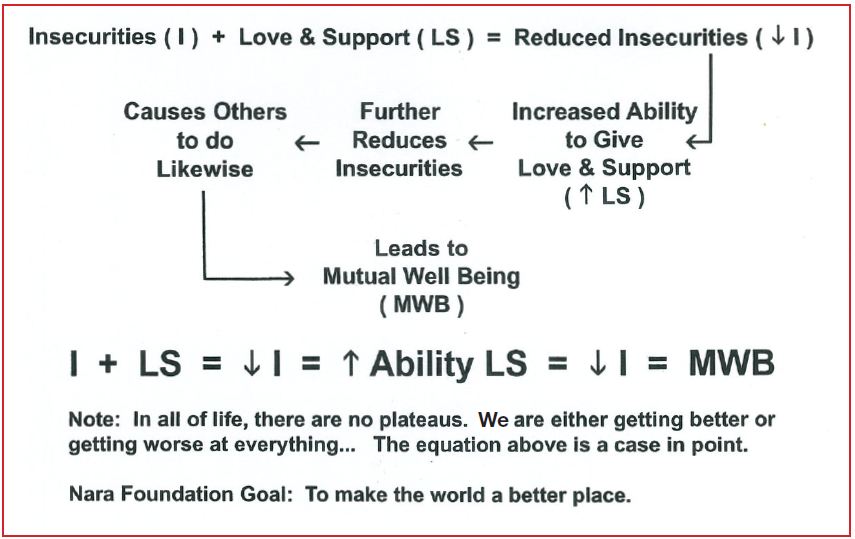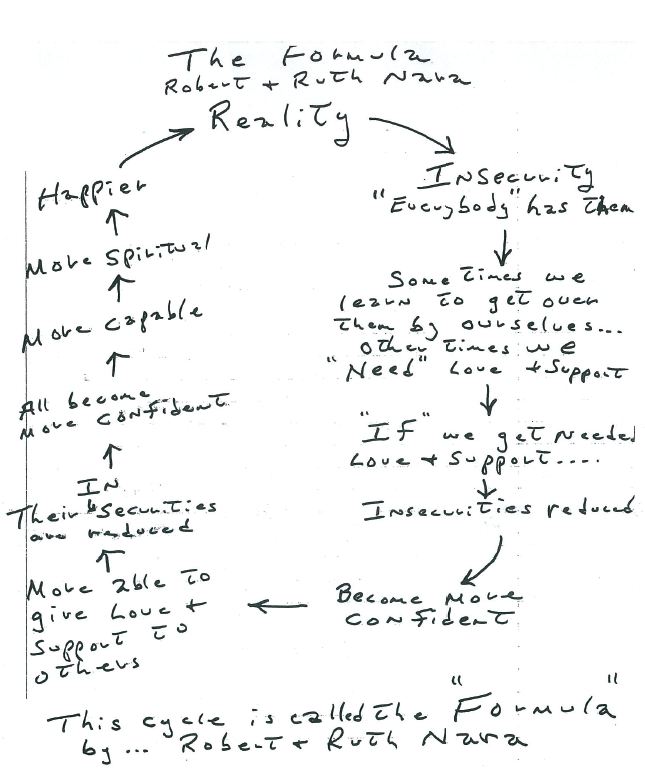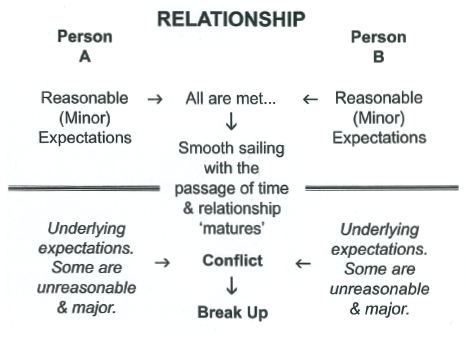The 12 Concepts Guaranteeing a Rewarding Life
- Concept
- There are no plateaus
- Importantitis
- Insecurities + Love + Support Equation
- It’s a matter of horsepower
- Handling stress
- What are we becoming?
- Accusing others of what we are guilty of ourselves
- When the student is ready the teacher will appear
- Social I.Q.
- Regarditis
- Relationship Formula
Life is a matter of thousands of small individual events rolled up into years of existence. To best understand and succeed in life, we believe that it is best to work in simple terms with the basic building blocks of life. If we have all of the basics firmly in place, then as the complications of life come along, we can handle them better. The basic formula of life will keep things running smoothly as we proceed over rough and bumpy parts. Without the basic formula in place, difficulties can turn over the entire apple cart.
We feel sorry for the multitudes who feel that life is very complicated and feel that there is not much they can do to change things. In reality, we see it as an excuse for their failures.
We will present a series of equations. Though simple in nature, they can lead people to successful lives – IF they have the will to simply apply them to their own individual lives.
This section contains the specific steps to give your relationship power – the A to Z Steps – proven with over 50 years of socioeconomic research.
1. Concept
Something conceived in the mind. A thought, notion or idea utilizing facts on a very ide or broad basis.
Conceptual Thinking: The ability to paint on a broad basis. Huge thoughts. Solving big problems requires an ability to look at and see the Big Picture. Small facts are important but only that they are a part of the total picture.
Example: In order for two people to be compatible, they must have the right concept going. The details of mutual life are relatively unimportant. Existing together in harmony is a concept which must be performed properly (correctly.)
Most people lead their lives about 1/4″ in front of their noses!! Ruth and I feel that this is a serious mistake. If we are to plan our work, then we need a format on which to design the plan.
2. There are no plateaus.
Over the past many years, our observations lead us to believe that almost all humans are either improving or going downhill. This includes monetarily – they are either becoming better off financially or they are going further into debt.
Most people are spending money they haven’t earned yet, on things they don’t need, to impress people they don’t like…these types are naturally going downhill, financially.
The same principle applies to many other aspects of life. Perhaps they are becoming more secure about themselves or more insecure…developing better social skills or worse social skills. And so it goes – up or down as time goes on. Very few people are aware of this phenomenon (as it applies to them). It is sometimes hard to detect, especially where the change is gradual. For better or for worse. It sounds like a part of a marriage contract, doesn’t it? Well, it’s true here also. Most marital relationships ARE getting better or getting worse… it’s everywhere. Watch for it. Be sure that you are using this circumstance to benefit yourself, and perhaps others as well.
3. Importantitis
How important are you? Really.
Being important seems to be a normal desire with most people in society today. However, it seems as though this desire has escalated in recent years to the point of being an epidemic.
There seems to be a center of the brain which tells us how important we are. However, when a person wishes, or worse, demands to be more important than they really are, that center in the brain becomes inflamed!
It’s called “Important-itis” – an inflamed or diseased brain driving people to conduct themselves in abnormal ways. This out-of-control desire to be more and more and more important has progressed to pandemic proportions.
Most people are aware of others’ demands for this type of attention which fulfills this abnormal need. Some smaller people may even catch themselves demanding excessive attention…Importantitis. This condition (disease) is a serious drawback to good communication.
Watch for it. You’ll see it everywhere. A very easy place to observe this pandemic spreading across the nation is on the highways. It’s called “Road Rage.” In Grandpa’s day most drivers treated each other with a certain element of courtesy and respect. Not any more!
Most drivers demand that the use of the roadways is for their individual pleasure. They want you out of their way and if you don’t do so, they are immediately ANGRY – instantly ready to run you over or crowd you off into the ditch!! Other examples of Importantitis are everywhere. This psychological demand is what is causing most people to become very self-centered. “It’s MY WAY or the Highway!” (Here we are – back to Road Rage.)
Importantitis is also affecting people’s financial situations. The current national savings rate is less than zero. Most people are spending money they haven’t earned yet on things they don’t need… to impress people they don’t like! Why would they be doing something so foolish? Importantitis.
Impressing other people by overspending is a sure route to bankruptcy. The bankruptcy rate is skyrocketing. The main reason…Importantitis!!! All interpersonal relationships in our society are under fire because of the Importantitis problem. Married couples are having a very difficult time
getting along. The divorce rate is the highest in history and getting worse. Live-in relationships are reported to be experiencing even more trouble than the marriage group.
The solution seems to be that everyone who is practicing Importantitis must recognize their wrong-doing and re-train themselves to treat others with respect and kindness, setting an example for others.
4. Insecurities + Love + Support Equation
5. It’s a matter of horsepower
Engines come in many different sizes: car engines, truck engines, locomotives, aircraft carrier engines, etc. The bigger they are the more horsepower they have. Human beings are similar to engines, in that some have more horsepower than others. They have more “drive,” more thrust, more get-up-and-go power! It’s easy to tell the difference…the ones with the most horsepower are the ones who make things happen.
There is a much larger group who watch what is happening and an even larger group who have no idea what is happening. This relates closely with the “Social I.Q.” – Small people talking about other people; medium sized people talking about events; and really big people who think up and discuss ideas. It also relates closely with the levels of “Ethical I.Q.” Generally speaking, the higher the horsepower, the higher the moral and ethical values. (This is not always true, however, such as in the case of Adolph Hitler.)
6. Stress and mutual well-being
The greater the “well being,” the greater the ability to handle stress! Our studies show that a great deal of stress is self-induced! Therefore, anyone having a life partner…who has a great relationship with that partner and ideally with others in their socioeconomic circle…will be relatively free of stress (other than work related, etc.) Therefore, they can help others find and achieve well-being (less stress.) The “Formula” therefore, repeats itself over and over, hopefully spreading to many others.
Anyone who understands the “Formula” can easily fit into relationships and easily diagnose in-coming situations which are not in their best interest and can handle them accordingly so that they are not harmful. This concept is a secondary benefit!
7. What are we becoming?
After 50 years of very careful observation we have concluded that: as human beings, we do change somewhat as life goes on. These changes are partially influenced by the people with whom we associate. In other words, we become like the people we associate with.
Therefore, we should choose carefully with whom we befriend and spend time with. If we choose winners, we are more likely to become winners. If we choose losers, we will most likely become more like losers ourselves. If we choose “big people” (see reference to people’s size, page 109) we can expect to discuss ideas. If we select “small people” we end up talking about other people (gossiping). It’s your decision.
8. Accusing others of what we are guilty of ourselves
It’s a funny thing, but true, that most people who are uncomfortable about themselves, for whatever reason, find it necessary to criticize others for the SAME REASON. We see it as a protective mechanism. People accuse others of what they are guilty of themselves. Most people are unaware of this phenomenon. It is very helpful in this way – if you listen well, people will tell you about themselves…and most (especially the small people) love to criticize others.
If they say, “Those people throw their money away on_____ and_____,” this tells us that they are insecure about how they handle their own money. Watch for this process – it’s everywhere. Another example is that they may imply that so-and-so is a “loose woman.” What do you suppose they are hiding? The converse is also true, e.g., men criticizing other men for running around, when that is what they themselves are doing.
The examples we are using here, money and sex, are just that – examples. The same methods apply to a wide variety of other human actions. Refer to the “Policy Manual” (on page 106.) The 6 destructive actions are at play here. Let’s select a generic example; let’s say that someone has cheated on a business deal. First of all, they may wish to “DENY” (Action #2.) “I really didn’t do anything wrong (by cheating.)”
Action #3 says, “I can “DEFEND” my action, because they cheat me too, therefore, it’s all right for me to cheat them back. Furthermore, “SPIN & BLAME” (#4) causes me to justify to myself that they are to blame in the first place, because of blah, blah, blah…And, they shouldn’t be picking on “POOR LITTLE ME” (action #6.) Then it is time to attack. “You are nothing but a great big cheater yourself,” (accuse others!) Finally, “DEFY”(#1) anyone who says you are wrong…and (#5,) Get as many people as you can to agree with you, (seek support.) This completes the cycle and explains why people accuse others of what they are guilty of themselves.
9. When the student is ready the teacher will appear
Most people are more interested in being entertained than being educated. There is a lack of interest in basic knowledge because it requires more effort to think than it does to play. If you want to GROW in the areas of socioeconomics (relationships) you must put out effort. You must want to learn. If this is lacking, we call it lack of-want-to, or “lack-o-wanna.” When people fire up to learn – you can try it – you will undoubtedly discover a teacher somewhere near.
Plan your work and work your plan.
If you have the “wanna” or desire, then you need a plan. Who is going to draw up the plan? YOU ARE! It is a part of the price you pay to become successful. No plan = no success. Even a not-so-good plan is a LOT better than no plan, because at least you got started. This can be modified as you move along as long as you maintain your “wanna.”
10. Social I.Q.
As a result of our studies, we have identified three levels of Social I.Q.
Level One: we call small people. Their main characteristic is that they talk a lot…mostly about others.
Level Two: we call medium size people. These have many of the characteristics of small people but are more advanced in that they can think and talk about events.
Level Three: we call big people. They are even more advanced in that they can think, talk and generate ideas.
Small People talk about People (gossip)
Medium People talk about Events
BIG People talk about Ideas
11. Regarditis
Earlier in these materials the term Importantitis was defined and examples given. Earlier also, the matter of insecurities was addressed. It is very interesting to note that these twoconditions sometimes intersect, causing a condition we call “Regard-itis.” Our self-centered society always wishes to be held in high regard. It’s a specialized form of Importantitis. When a person is faced with a situation in which someone they know is obviously being held in higher regard than he or she is, he or she becomes angry. They think, “Why should this be?” Whether it is founded or unfounded is usually beside the point. They don’t like it, period! The anger can cause a variety of actions, the first being to lay blame on someone for it – whoever is handy. Sometimes the target of the anger is the person who is being held in higher regard. Sometimes it is the person who is displaying higher regard for someone else. Either way, the person who is showing their Regarditis is revealing their immaturity. It is a “small person” characteristic.
Anyone who gets upset when someone else is receiving adulation or being held in higher regard should recognize this as such. The next intelligent step is: grow up, dummy! Furthermore, quit wasting time on the negative and pour all emotional fluid into increasing one’s own capabilities so that in the future he himself is more likely to be the one who is being held in high regard.
12. Relationship Formula Conclusion
Conclusion
If Conceptual Thinking sounds like a good idea to you, if the Formula seems to be making sense to you, and you wish to expand this type of thinking, then proceed to studying Feelings, Having an Encounter with Yourself. If you wish to proceed further, then study The 180° Theory. By then, if you incorporate these thoughts and principles into your daily life we sincerely believe that you can – and probably will – succeed in whatever you choose to do with your life.
Plan your work, and work your plan.
Bob & Ruth Nara
The Gunny Sack
Everybody’s walking around with a gunny sack of rocks to carry.
This is analogous to the various stress items we face in today’s world, each stressor comparable to a rock. These stressful situations add to the existing weight already on us (in the gunny sack.) So if we are stressed about a situation, we add a rock to our sack. If we would talk about the situation with a trusted person, we could eliminate the rock and the weight.
In general, people are not very good about this. Instead, we keep on putting rocks in the sack without dealing with the problems and pretty soon, the sack breaks and we start flinging the rocks, making accusations, remembering all the hurts, and bringing all the problems out at once.
Since there is no way to totally avoid stress, we need to strengthen ourselves to carry the sack, and not ever let it fill up. Some carry the weight better than others.



